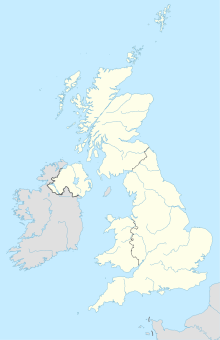Tettenhall
Coordinates: 52 ° 36 ′ N , 2 ° 10 ′ W
Tettenhall (the name is believed to be derived from Teotta's Halh , where a Halh means a protected place, while Teotta was a Saxon male name) is a district of Wolverhampton with a great history. The battle in the forest near Tettenhall was the turning point in the battle of Edward the Elder against the Vikings in 910.
The current church of Tettenhall, St. Michael and All Angels , already existed at the time of the Domesday Book (1086). At that time (based on the taxes levied) around a hundred people lived there. Also worth seeing and a symbol of the city is the Clock Tower from 1912, built in memory of the coronation of King George V. Also noteworthy are: Wightwick Manor, an ensemble of mansions from the late 19th century; the old windmill from 1720; Compton Hall (1845); Salisbury House, originally owned by the Thorneycrofts (see below), now an office building; St. Jude's Church; and West Park, the district's recreational park.
Tettenhall has a shopping street and an arcade and is crossed by the A41 trunk road . Although it was incorporated into Wolverhampton in 1966 , its rural character was retained. In 1851 there were 3,396 inhabitants, today the Wolverhampton districts of Tettenhall-Wightwick and Tettenhall-Regis have around 11,000 and 12,000 inhabitants respectively.
Tettenhall has its own public school , Tettenhall College , which is housed in Tettenhall Towers , the seat of the Thorneycroft family. Perhaps the most famous student of this college was Arthur Harden . The Thorneycrofts, for their part, were famous conservatives. In the 1860s Benjamin Disraeli tried personally to win Colonel Thorneycroft for a candidacy for the British House of Commons , but the latter declined.
Besides, he was an extremely eccentric man. He was known for pushing his butlers off the towers of his castle to test various flying machines he invented. A descendant of Colonel Thorneycroft became British Chancellor of the Exchequer , Peter Thorneycroft , in the 1950s .
Other well-known sons and daughters of the place include:
- Edward Banks, poet (20th century)
- Herbert Westren Turnbull , mathematician (20th century)
- James Brindley , engineer and canal builder (18th century)
- Thomas Congreve, engineer, rocket designer (18th century)
- Henry Hartley Fowler, First Lord of Wolverhampton, Noble Politician, Colonial Secretary
- Sir Alfred Hickman, industrialist
- Admiral Richard Leveson
- William Pitt, local historian and poet
- Thomas Telford, road construction engineer
literature
- Geoffrey Hancock: A Tettenhall History. Broadside 1991
- John Raven: Tettenhall. Broadside 1990
Web links
- Tettenhall.co.uk ( Memento of November 2, 2008 in the Internet Archive )
- A Short History of Tettenhall
- Tettenhall College
